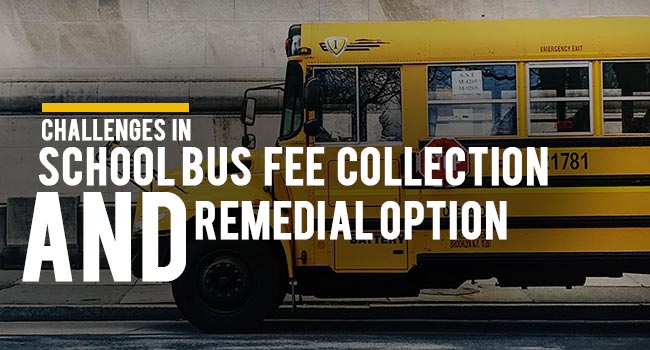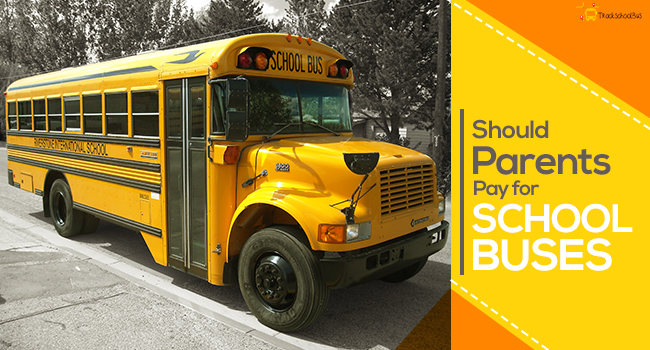The distinct yellow school buses are a very well-known and unmistakable part of school life across the globe. School buses are considered to be the safest and easiest way of transportation for students to get to and from school.
To ensure seamless functioning of this transport system, schools have to meet certain stipulations. The expense for keeping them in operation is considerable and the maintenance of the fleet is continuous. The transport fee paid by the students is the main contributor to keeping this system functional.
Pay Your School Bus Fee in a Single Touch Click Here To Learn More
Collection of this fee from each student is not a simple task, though it seems easy enough at first glance. Challenges faced by the school in the collection of bus or transport fees are varied.
Providing easy and convenient methods of payment to parents helps the school authorities in the regular collection of fees. Schools have traditional accounting systems with personnel appointed in-house to collect fees from parents of bus users.
In addition to this, modern age tools like online payments, bank transfers, credit and debit cards, preloaded swipe cards and the like also facilitate payment with ease.
Non-payment of School Bus Fees – Common Causes
-
Fee Defaults occur due to various reasons – loss of employment of the parent, a sluggish economy, seasonal trade, bad planning, or plain old forgetfulness.
All of the above can be remedied by timely reminders and follow-up by the school administration staff in charge of fee collections, with a few extreme cases where the higher school faculty will need to be enlisted for assistance.
-
Loss of employment of the parent is one of the major reasons for defaulting on fees payment. A re-prioritization of their budget very often puts the school bus fees on the lowest rung.
Long drawn out litigations involving considerable amounts in legal fees and unexpected medical expenses incurred are other factors that topple an otherwise normal budget at students’ homes.
-
Deterioration in family relationships like parents’ divorce is another factor. They blame each other and are undecided on the responsibility of their wards expenses. This ends up in not making the payment.
These and many other reasons can be attributed to non-payment of the fee by the parents. This being a very sensitive matter, the school authorities need to approach this problem with caution, patience and understanding. This can be tackled in different ways.
Communicate with Guardians
Communication with the parents is of utmost importance. It would be wise to send them a reminder a little before the fee due date. Sometimes the parent forgets to make the payment due to daily workplace pressures.
So a reminder would be of real help. Reminders could be sent through e-mails, text messaging, SMS alerts, letters and personal phone calls over and above the age-old use of the ‘student diary’.
In addition to this, the school authorities can ask parent to come to the school for a one-on-one explanation. This is seen to be very effective as the school can actually assess the parents’ distress and offer help as the situation may warrant.
Offer Tailor-made Solutions
Financial difficulties faced can be temporary in nature. An assessment of the parent’s status in case of fee payment would be appropriate before the school decides to offer payment plans. Some of the other factors that may be considered before offering any tailor-made payment options are:
• Number of evasion
• Possibility of the parents recovering from their current financial predicament
• Recovery of the fees in an amicable manner
In case of first-time defaulters, the school can chalk out a plan wherein the due amount can be paid in a single installment.
This may entail giving a discount on the total amount owed if they agree to pay, but will ensure receipt of a major portion rather than receiving nothing at all.
If this doesn’t seem favorable, a suggestion to clear the entire dues in installments over a fixed period of time can be offered.
A regular evasion may have to be dealt with in a more stringent manner. Students may be restricted from entering buses after all the due notices are given to parents.
Some schools prevent students from participating in sports, athletics, games and other extra-curricular activities. It is a ‘no pay, no play’ policy.
Schools withhold reports and results till all the dues are cleared. Students, thus penalized, consequently put pressure on their parents to make payments.
These actions, since being done in front of peers, may affect students psychologically and should be weighed seriously before enforcement.
Co-ordination and cohesion are required between the transport department and the school authorities if these measures are to be adopted. Such decisions are usually taken by more senior members of the school faculty or administration.
Read Also : Should Parents Pay for School Buses?
Other Methods
In countries and states where a transfer certificate is not insisted, parents tend to shift their wards to other schools to evade paying any and all pending dues. Making these documents mandatory will force them to clear their outstanding dues.
If these methods do not work, then the school can seek legal assistance. It may be a long drawn process, but recovery of amount is beneficial to the school bus operations.
A sure way to ensure zero outstanding on fees is to link them to the parent/guardian’s credit card with automatic payment transfers on each due dates. In this manner when an invoice is raised by the school’s accounting system, it will be paid immediately by a transfer from the pre-assigned credit card.
It would be prudent to obtain a bus enrolment contract signed by each parent. The contract with legally enforceable terms and conditions should be in place at the start of the academic year.
Conclusion
There is no strategy that works perfectly. Parents and school authorities have to work out a compassionate system wherein bad debts can be reduced, and losses minimized so that a viable school transport system is still available to the majority of the school bus users.

